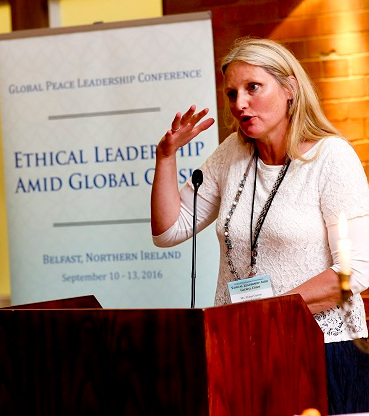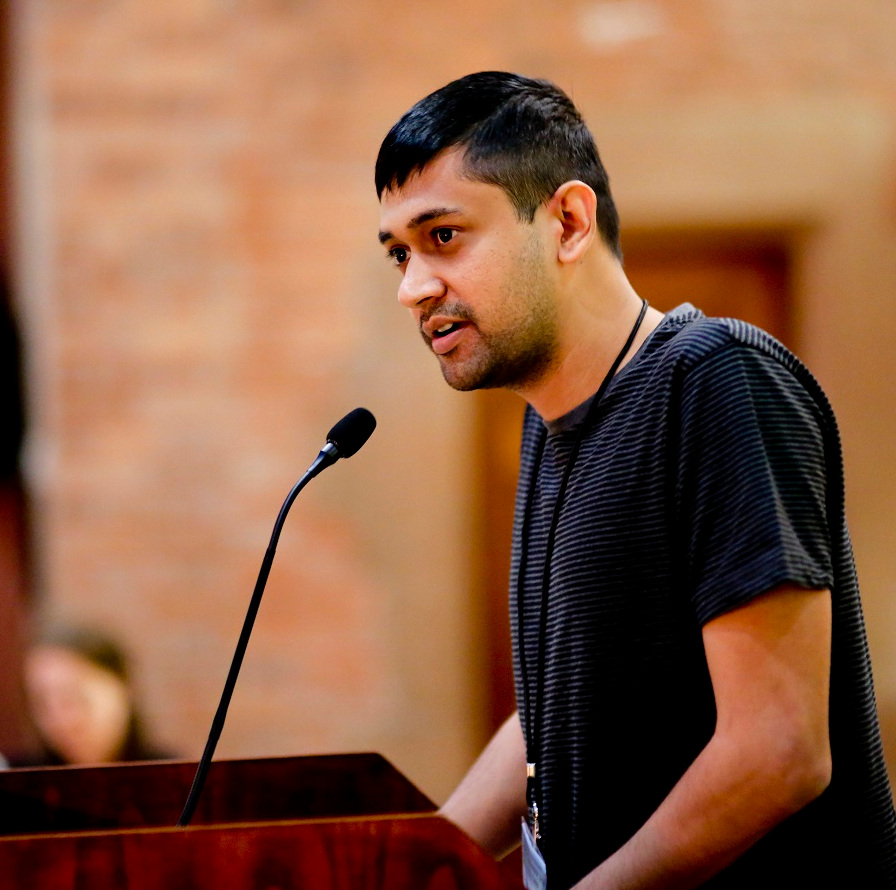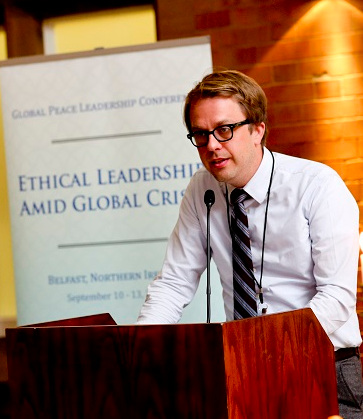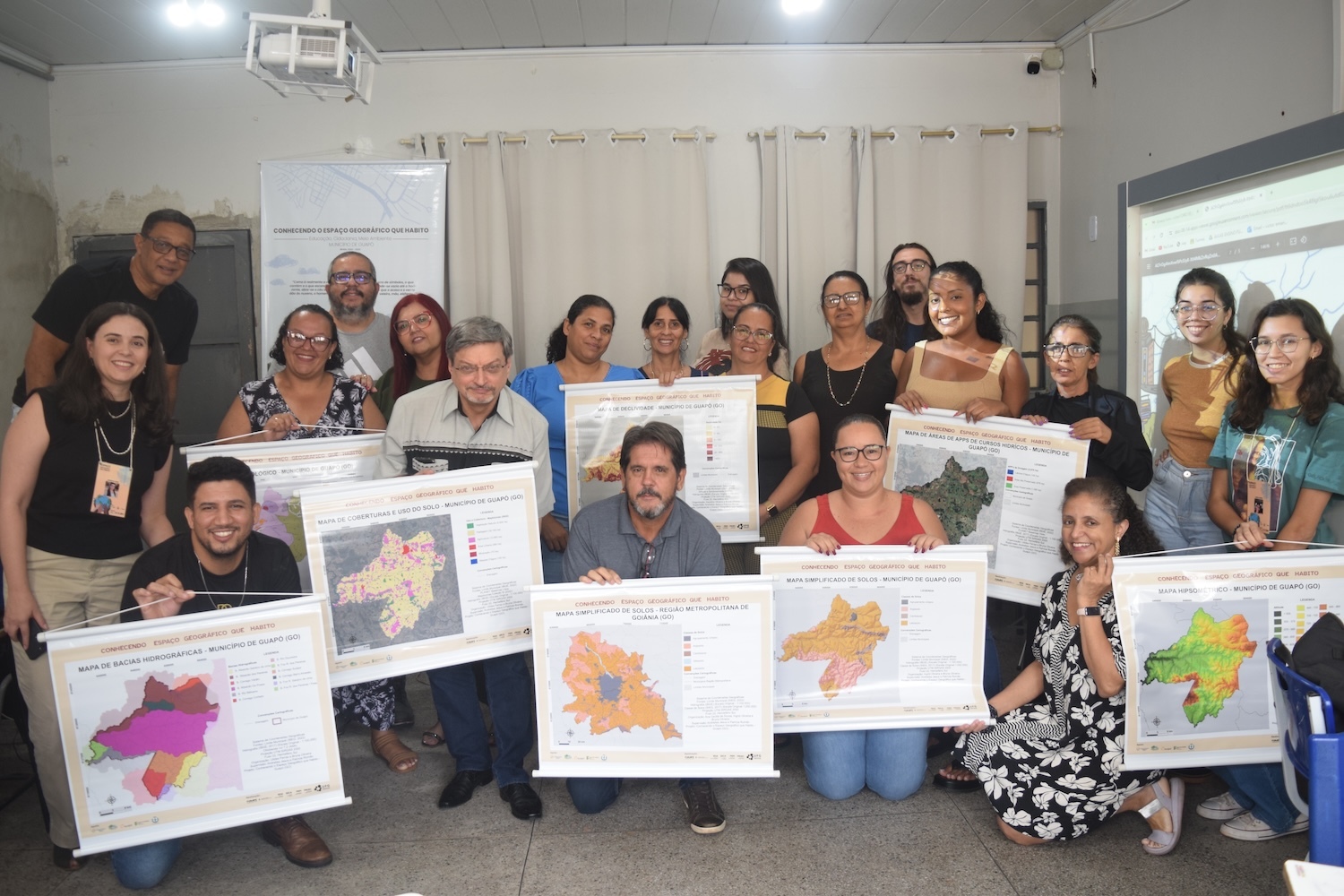“Even if the hopes you started out with are dashed, hope has to be maintained.” -Seamus Heaney
A special commemoration held during the Global Peace Leadership Conference Belfast 2016 remembered the victims of violent extremism around the world on the fifteenth anniversary of 9-11.
On the occasion, three poets from the Seamus Heany Centre for Poetry read their original works, bringing forth a shared resolve to transcend terror and build bridges across communities to secure peace and prosperity.
The Dark Hedges
Jamesy was walking back from the dole one day
past the Big House. It was about 3 miles home.
Better wearing out the boots
than wearing out the bedclothes,
his father had barked at him.
At the time you had to sign on in the Orange Hall
─ imagine! ─ the wooden floor, sun and dust smell,
mahogany boxes with yellow cards.
A desk, a chair, a file of people
queued out the door.
He was scunnered in the cold, early morning.
On the way back he snapped
a few photos with his second-hand camera.
The local paper published one. Everyone wanted it.
The corner shop made it into a black and white postcard.
Then the negative got scratched, the original got lost,
and he went across the water
with his camera and a folder full of photos.
He traipsed round everywhere to find work.
This was long before film sets or tourist buses back here.
On the day of the ceasefire
a big London broadsheet newspaper
ran an article and a full-page feature
of his photo ─ The Dark Hedges
as first light filtered through the inky branches.
Elaine Gaston
 Elaine Gaston is from the north coast of Ireland. She was educated at Oxford University and at Queen’s University, Belfast where she is a PhD candidate at the Seamus Heaney Centre for Poetry. In 2015 she received an ACE Award from the Arts Council of Northern Ireland and was runner-up in the Vincent Buckley Poetry Prize. Her first collection, The Lie of the Land, published in 2015 by Doire Press, was Highly Commended in the Patrick Kavanagh Award. ‘The Dark Hedges’ was first published in The Yellow Nib.
Elaine Gaston is from the north coast of Ireland. She was educated at Oxford University and at Queen’s University, Belfast where she is a PhD candidate at the Seamus Heaney Centre for Poetry. In 2015 she received an ACE Award from the Arts Council of Northern Ireland and was runner-up in the Vincent Buckley Poetry Prize. Her first collection, The Lie of the Land, published in 2015 by Doire Press, was Highly Commended in the Patrick Kavanagh Award. ‘The Dark Hedges’ was first published in The Yellow Nib.
Things To Carry Before You Flee
No duvets, Maggi packs, essays on Phenomenology,
mobile chargers; and certainly no sanitary napkins –
they don’t work in a land gushing with blood.
Maybe a fragment from Isaiah, earphone plugs
to protect your eardrum, a scratched CD to see
your reflection, the soles of two left shoes
to wade right through bushes, a guitar
draped in satin to be held as a double-barrel,
just in case.
These are some of the things you can take
before you flee – disposable but not yet, plus
the opulent necessity such as a nail clipper
(you need to stitch it in secret inside the pyjama
pants with pockets deep enough to bury
your sufferings.)
That way, if you do end up reaching a refugee
camp, you can indulge a little in clipping your
forlorn nails as the authorities fill out forms
to tag you in. That way, when you get to hold
a morsel of food to the mouth, you are not so weak
as to be weighed down by a gram of nail.
Shriram Sivaramakrishnan
 Shriram Sivaramakrishnan is a poet from India, is currently pursuing Masters in Poetry at Queen’s University Belfast. His poems have appeared in Softblow, The Mondegreen, Message in a Bottle and so on. He tweets at @shriiram.
Shriram Sivaramakrishnan is a poet from India, is currently pursuing Masters in Poetry at Queen’s University Belfast. His poems have appeared in Softblow, The Mondegreen, Message in a Bottle and so on. He tweets at @shriiram.
War Music
Though the purity
Of moonlight has silenced
Both nightingale and
Cricket
—Anonymous
i. Ensemble
Then music was whatever moved
between two fences––even boots,
guards speaking in the rain
to one another, wind in chain-link.
Or in the black that wrapped our barracks
what echoed through sleep became far-off
engines starting, then stalling in salt-water.
During work in daylight heat,
even a low song would pass through
a group of men in unison,
an ensemble hidden by their labor,
the religious and the irreligious humming
a hymn or “Tumbling Tumbleweeds”
like song itself was hesitating over them,
then lifting, with no spirit left behind it.
A holding off of the deeper knock of grief
while hands went hacking, cutting to clear
the wood free of all its bamboo staves.
ii. No Trumpet
No flutes in those bands.
No dancers in the men.
Not then. Though some guy
carried one trumpet
mouthpiece he could blow
as if ripping open
a book of griefs,
and through its silver
lips, the phantom
horn resounding
like a chorus
of delighted wives.
iii. The Bow
But it was the bamboo music of the violin
that caught and held me like a nervous fish,
lifted then re-baptized in a new and cleaner
source. From the sound of leaf and cane
thinned as horsehair, drawn across
that jointed body, grassy pitches went up
like ladders in the night around our heads.
And the sound of tongues thrummed
lowly in the dark. The only fiddle player
in the camp would tilt his neck
where we wrapped around him like gauze
in the middle of that bamboo room,
and rock the moon to sleep, gliding the bow
until it pointed past him, the way
I imagine Christ appeared in the boat
showing his disciples to the other side.
Andrew Deloss Eaton
[Acknowledgment:“War Music” was the winner of the 2016 Tupelo Quarterly Poetry Prize, selected by Tracy K. Smith. ] Andrew Deloss Eaton is an American poet living in Belfast, Northern Ireland. His work appears in or is forthcoming in journals such as Copper Nickel, The Moth (Ireland), Poetry Ireland Review, and Prelude, among others. His chapbook Sprung Nocturne is forthcoming.
Andrew Deloss Eaton is an American poet living in Belfast, Northern Ireland. His work appears in or is forthcoming in journals such as Copper Nickel, The Moth (Ireland), Poetry Ireland Review, and Prelude, among others. His chapbook Sprung Nocturne is forthcoming.



